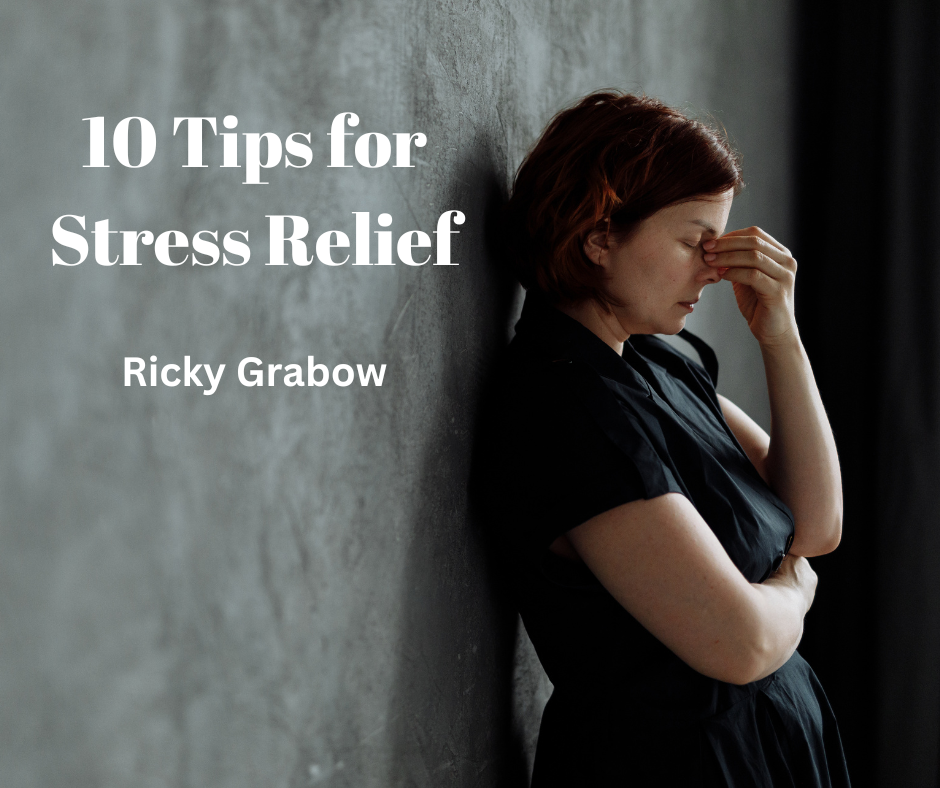
10 Tips for Stress Relief
Today we are going to discuss stress relief techniques! The holidays are here. Is there a more stressful time!?
Stress can plague an exercise regime and is serious to address if you want to do your best in the gym! Stress causes a lot of people to “take time off” and never comeback. It also causes us to hold onto fat, so get ahead of the issue and stay on track! Enjoy!
1. Prep for tomorrow.
Nothing is more stressful than being unprepared. Get organized so you’re ready for the next day, taking a few minutes to make a to-do list and clean up before you leave. Knowing you’ve got everything covered means you’ll be less likely to fret about work in the evenings. When you come in the next morning, you’ll have the sense that you’re in control of the situation and can handle it. This sets a positive tone for the day, which can help you get more accomplished.
2. Arm yourself with healthy snacks.
According to an American Psychological Association (APA) survey, more women than men (one in three) turn to comfort food such as ice cream and cookies to ease stress. It’s common for women to deny themselves favorite foods because they’re trying to lose weight. But under stress, the urge for them becomes even stronger.
In fact, researchers at Montclair State University in New Jersey recently confirmed that dieters are more likely than non-dieters to overeat when under pressure, bingeing on the very same high-fat foods they normally try to avoid. The key is to not deprive yourself. Keep three or four healthy snacks on hand that you know you’ll probably want–peanuts, if you like salty; string cheese, if you crave protein; a small piece of chocolate for something sweet–so you aren’t
3. Make Routines.
Doing almost any routine, repetitive activity (like vacuuming, shredding paper or knitting), or reciting a word that represents how you wish you felt (such as calm) is a quick way to achieve a Zen-like state.
Studies show the effects lower blood pressure and slow heart rate and breathing. The crucial elements are to focus on a word, your breathing or a movement and to bring your attention back to your task if your mind wanders or negative thoughts intrude.
4. Use Proper Hand Washing Techniques
When you’re under pressure, you’re more susceptible to cold viruses and other germs because your immune system is suppressed. Hand washing is your best defense. Lather up with soap and warm water for 10-20 seconds, or the time it takes to sing Happy Birthday.
5. Listen to some music.
According to a recent study published in the British journal Heart, slow or meditative music is a proven stress buster, so set your dial to a soothing station during your commute.
And, if you’re stuck in a traffic jam, sneak in this quick exercise: Grab your steering wheel and clench the muscles in your fingers, arms, shoulders and back. Do this until your muscles begin to tremble (about 45 seconds), then release. You’ll produce a wave of relief in your upper neck and arms all the way down to your fingers. Just make sure your foot is on the brake when you let go of the wheel!
6. Use the ATM once.
Limiting your cash withdrawals to once a week is a quick, easy way to monitor your spending habits. Multiple trips to the ATM make it harder to track your money. If you put yourself on an allowance and pay cash for everything, you’re more aware of what you’re spending and more careful about what you buy.
And while thinking about your finances may be enough to send you over the edge, it turns out that getting them under control eases tension in the long run. (Money and work tied for first place as the leading sources of stress, according to an APA survey.)
7. Hit the pool
A Swedish study published in the International Journal of Stress Management found that floating in water triggers the body’s relaxation response, helping lower stress-hormone levels. Even better, nearly 80 percent of the subjects showed improvements such as feeling less tense and depressed.
8. Reduce use of Technology.
Thanks to e-mail, cell phones, and BlackBerrys, it seems like your job never ends. The increasingly blurry boundaries between work and home life leave us with less downtime than ever before (and in some cases, no downtime!). Advances in technology are a leading source of chronic stress, putting many of us in a constant state of alert. Not to mention the effect it has on family ties.
A recent study published in the Journal of Marriage and Family found a link between the use of cell phones and pagers at home and increased stress, which spills over into family life.
To make technology work for you, screen calls with caller ID or, better yet, limit your cell phone and e-mail use to working hours only. Can’t kick the BlackBerry habit? Set a regular time you’ll check it in the evening (say, after dinner), so you’re not constantly disrupting home life to keep tabs on work.
9. Recall a past success.
Taking five minutes to reflect on how you pulled through other stressful situations like your last breakup or when you switched jobs can help you reconnect with your resilient side.
In the moment, it may feel as though you’ll never get over your present problem, but when you look back, you realize that you felt similarly before and found a way to overcome it.
If you’re going through a divorce or recently lost a loved one, you also may want to seek out a support group: Research on grieving presented by the Center for the Advancement of Health in Washington, D.C., suggests that talking with peers is even more beneficial than one-on-one counseling in the initial months after a loss.
10. Worry about one thing at a time.
Women worry more than men do. A study of 166 married couples who kept stress diaries for six weeks found that women feel stress more frequently than men because women tend to worry in a more global way.
Whereas a man might fret about something actual and specific—such as the fact that he’s just been passed over for a promotion—a woman will tend to worry abstractly about her job, her weight, plus the well-being of every member of her extended family. Keep your anxiety focused on real, immediate issues, and tune out imagined ones or those over which you have zero control, and you’ll automatically reduce stress overload.
If you are loaded with stress right now its important that you address it NOW!! If you chose not to manage your stress it could have a devistating effect on your health. If you need help, we are here! Contact us. Getting on a exercise and diet regiment will absolutely help you manage your stress.. Don’t waste another minute being stressed!

